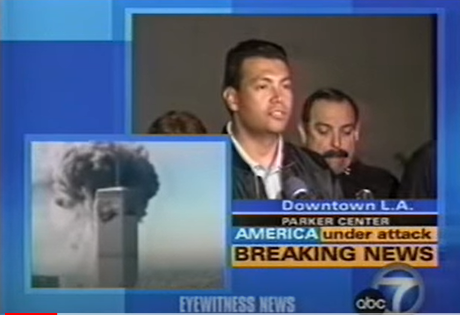On September 11th, Alex Padilla woke up as the deputy mayor of LA. Here’s what he remembers – Daily News
Alderman Alex Padilla, aged just 28, had a promising career in politics but much to learn and little thought about becoming incumbent mayor of Los Angeles.
Little did he know, when he woke up in his northeast LA home, that a series of unspeakable attacks would strand Mayor James K. Hahn in Washington, DC, and leave the new politician Padilla in charge. The native Pacoima was at the head of the second largest city in the country.
The date: September 11, 2001.
With the moments of that fateful morning, a mammoth leadership challenge also unfolded: Trying to maintain calm and clarity in his city after the grief, questions, and anger fueled by the deadliest day ever on U.S. soil.
“It took me about half a second to realize,” said Padilla, “that Jim Hahn, mayor, was out of town, out of state, and that … wait a minute … he’s actually in Washington.”
Like most Americans, Padilla watched the horror live on TV – the Towers, the Pentagon, Pennsylvania. In the meantime, the Los Angeles City Charter came into force – and made the President of the City Council incumbent mayor.
Forward 20 years and Padilla is now California’s junior U.S. Senator. But on Friday, September 10th, the day before the 20th anniversary of the September 11th terrorist attacks, the memory of the moment when he realized that this was no ordinary emergency is still there.
Padilla recalls an ominous scroll at the bottom of a television screen: “Four unspecified planes are en route to Los Angeles.”
“Is this real? Isn’t it real? You can’t assume it isn’t. That got the adrenaline pumping,” he said.
“The chatter among the news people was when our nation is under attack and we don’t know by whom, it’s only natural, Washington DC, New York, who’s the next target, right? New York is the financial capital of the country, Washington is the government capital of the country, but Los Angeles is the second largest city in the country, ”said Padilla.
This was a morning like no other for Padilla.
Telephones! Bring in Police Chief Bernard Parks. Start using the phone. Many of them. Shower. Go to the town hall. “Ditch” the car in front of the cathedral. Sprint to the office.
After consulting Hahn over the phone, Padilla officially activated the city’s Emergency Operations Board, which brought together regional first responders and the heads of the city’s main departments.
The city’s residents would soon get a round-the-clock look at their incumbent mayor. Padilla urged residents to donate blood. He showed them how to get traffic information from the city’s website. He constantly conducted press conferences in English and Spanish.
In his mind’s eye he can still see Fire Chief Bill Bamattre and a city search and rescue team – one of the most elite in the country – pleading to get to New York. And fast.
“I looked into the eyes of the firefighters – women and men – and I clearly saw not only the willingness to go, but also the desire to go,” said Padilla.
Padilla had to act fast – are you keeping her as mayor in LA or are you sending her to the center of the attack? After learning that there was “no credible threat” in LA, he approved the trip.
Their flight was the last flight before the FAA shut down all air traffic, Padilla said, he learned later. Within 24 hours they were on the ground at Ground Zero.
“There were a lot of theories about who was behind this before we really knew,” he said. “Anyone who looked Arabic was suddenly viewed with suspicion by many people. But Los Angeles isn’t like that … Let’s not jump to conclusions. Let’s not stereotype. Let’s not make the scapegoat. “
It wouldn’t be long before he found himself with fellow councilor Dennis Zine at the Islamic Center in Mid-Wilshire and begged Angelenos not to adopt hateful stereotypes after the attacks.
His three-day Los Angeles mayor’s office was non-stop activity and instant decisions, he said. He remembers the constant flow of information, the faces of his Angelo colleagues, the vigil in the town hall.
Nonetheless, Padilla took a trip to Tommy’s, the city’s iconic hamburger spot. The goal: To convey a feeling that things are okay in LA
Padilla paused to remember when days later the LA firefighters heading to Ground Zero came home.
“That was an emotional moment,” he said.
The political newcomer Padilla got off to a bumpy start as Council President. He reportedly angered proponents of the San Fernando Valley secession by removing Hal Berson, a Valley Cityhood supporter, from a study panel. And some council members were not enthusiastic about some of its committees.
Suddenly, however, the rumor arose that the three days may have accelerated Padilla’s political development.
Padilla shook off such talk. Padilla said he’s only honoring the LA charter. I’m just trying to help his Angelenos colleagues on three tough days.
“I was in that position when that happened,” he said. “Either you get on the job or I don’t.”
Finally, he said he learned the value of planning and communication.
He learned that the time to question such efforts is not in the midst of an unprecedented crisis.
“The middle of the emergency,” he said, “is not the time to question the plan.”
It also confirmed something a Little League coach had taught him as a kid.
Trust in teamwork.
“You don’t have to cross them all out,” he said. “You have a catcher in front of you and seven teammates behind you. Everyone plays a role. “


Comments are closed.